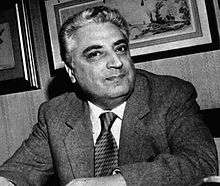Renzo De Felice
| Renzo De Felice | |
|---|---|
 | |
| Born |
8 April 1929 Rieti, Kingdom of Italy |
| Died |
25 May 1996 (aged 67) Rome, Republic of Italy |
| Occupation | Historian, writer |
| Nationality | Italian |
| Alma mater | Sapienza University of Rome |
| Genre | History |
| Subject | Benito Mussolini, Italian fascism and Jacobinism |
| Literary movement | Historical revisionism |
| Notable works |
History of the Jews under Fascism (1961) Biography of Mussolini (1965–1996) |
| Spouse | Livia De Ruggiero |
Renzo De Felice (8 April 1929 – 25 May 1996) was an Italian historian, who specialized in the Fascist era, writing, among other works, a 6000-page biography of Mussolini (4 volumes, 1965–1997). He argued that Mussolini was a revolutionary modernizer in domestic issues but a pragmatist in foreign policy who continued the Realpolitik policies of Italy from 1861 to 1922.[1]
Biography
De Felice was born in Rieti and studied under Federico Chabod and Delio Cantimori at the Sapienza University of Rome. During his time as student, he was a member of the Italian Communist Party. After the Soviet repression of the Hungarian Revolution of 1956, De Felice was among 101 Italian intellectuals who sharply criticized the Italian Communists for backing of the Soviets.
He broke with them and joined the Italian Socialist Party. He taught history at the University of Rome. He was married to Livia De Ruggiero. He died in Rome.
Mussolini biography
De Felice is best known for a massive four volume, eight book biography of Benito Mussolini that was almost finished when he died. De Felice was the founder and editor of the influential journal Storia Contemporanea. De Felice, a liberal Jew,[2] also wrote a well-regarded history of Jewish life under the Fascist government and articles on Italian Jacobinism.
De Felice's leading interest was in Fascism. In his view, there were two types of Fascism, "Fascism as a movement" and "Fascism as a regime". De Felice saw Fascism, especially in the "movement" stage, as a revolutionary middle-class ideology that had deep roots in the Age of Enlightenment. Moreover, De Felice insisted that it was not caused by fear of a proletarian revolution on the part of the lower middle classes, as Leftist historiography maintained; it was rather an assertive movement, originated by an emerging middle class in search for its proper role.
Fascism, as a regime, was seen by De Felice as nothing more than Mussolini's policy, which tended to make of Fascist ideology just the superstructure of Mussolini's dictatorship and personal power. De Felice felt that fascism should be seen as valid political ideology, not just something to be demonized and dismissed in simplistic terms. He argued that studies on Fascism should get out from the political debate and become a historiographical issue based on scientific assertions.
Furthermore, De Felice insisted that there was no connection or valid comparisons to be drawn between Italian Fascism and German National Socialism, which De Felice saw as being a completely different political ideology. Critics on the Left attacked De Felice for being too sympathetic to Italian Fascism. Giuliano Procacci, Paolo Alatri, Nicola Tranfaglia and others even accused De Felice of supporting Fascism.
Selected bibliography
- Storia degli ebrei italiani sotto il fascismo, 1961.
- The Jews in Fascist Italy. A History, Enigma Books, 2001. ISBN 978-1-929631-01-8
- Mussolini, 4 volumes, 1965-1997 (Turin, 1965–97)
- vol. 1, Mussolini il rivoluzionario, 1883–1920; vol. 2, Mussolini il fascista, pt. 1, La conquista del potere, 1921–1925, pt. 2, L’organizzazione dello Stato fascista, 1925–1929; vol. 3, Mussolini il duce, pt. 1, Gli anni del consenso, 1929–1936, pt. 2, Lo stato totalitario, 1936–1940; vol. 4, Mussolini l’alleato, 1940–1945, pt. 1, L’Italia in guerra, 1940–1943, bk. 1, Dalla guerra “breve” alla guerra lunga, bk. 2, Crisi e agonia del regime, pt. 2, La guerra civile, 1943–1945.
- Le interpretazioni del fascismo, 1969.
- Il fascismo: le interpretazioni dei contemporanei e degli storici, 1970.
- Intervista sul fascismo, edited by Michael Ledeen, 1975.
- Ebrei in un paese arabo: gli ebrei nella Libia contemporanea tra colonialismo, nazionalismo arabo e sionismo (1835-1970), 1978.
References
- ↑ James Burgwyn, "Renzo De Felice and Mussolini's Foreign Policy: Pragmatism vs. Ideology," Italian Quarterly (1999), Vol. 36 Issue 141/142, pp 93-103
- ↑ Guerri, Giordano Bruno (5 November 2015). "Il Duce governò col consenso. E De Felice lo ha dimostrato". il Giornale. Retrieved 17 November 2015.
... a quei tempi De Felice venne addirittura accusato di filofascismo: lui, ebreo liberale che fino a allora si era occupato soprattutto della Rivoluzione francese.
Further reading
- Ledeen, Michael, "Renzo De Felice and the Controversy over Italian Fascism", Journal of Contemporary History, Volume 11, 1976. pp. 269–283
- Painter, Borden' "Renzo De Felice and the Historiography of Italian Fascism", American Historical Review, (1990) 95#2 pp. 391–405 in JSTOR
- Gentile, Emilio, "Renzo de Felice: A Tribute", Journal of Contemporary History 32,2 (1997), pp. 139–151.
- Knox, MacGregor, "The Fascist Regime, Its Foreign Policy and Its Wars: An 'Anti-anti-fascist' Orthodoxy?", Contemporary European History, Volume 4, Issue # 3, 1995; pages 347-365
- Simoncelli, Paolo (2001). Renzo De Felice: la formazione intellettuale. Le Lettere. ISBN 978-88-7166-602-0.